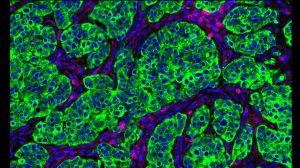Dr. Jane Bayani and Dr. Melanie Spears are helping bring new diagnostic tools to patients in their roles as Co-Directors of OICR’s Diagnostic Development program.
After more than a decade at OICR driving innovations in cancer diagnostics, Dr. Jane Bayani and Dr. Melanie Spears are leading OICR’s Diagnostic Development program toward even greater clinical impact. The longtime collaborators were named Co-Directors of the program in September 2022 after a period as Interim Co-Directors.
Bayani and Spears are both leaders in the field of cancer diagnostics, having pioneered innovative research into biomarkers for breast cancer and prostate cancer. Spears started with OICR in 2011 after earning her PhD from the University of Edinburgh and doing postdoctoral fellowships at the university and at Cancer Research UK. Bayani joined OICR in 2012 with research experience at Princess Margaret Cancer Centre and the Hospital for Sick Children and a PhD from the University of Toronto. Both also serve as Principal Research Scientists at OICR and Assistant Professors in the University of Toronto’s Department of Laboratory Medicine and Pathobiology.
Bayani and Spears were previously Associate Directors of OICR Diagnostic Development, working with former Director Dr. John Bartlett until he stepped down in July 2021. They were named Interim Co-Directors of the program in August 2021.
As they enter their first full year as permanent Co-Directors, OICR News checked in with Bayani and Spears about their new positions and their vision for the future of the program.
What does this new role mean to you professionally?
MS: Becoming Co-Director alongside Jane feels like a natural progression to the next stage of my career. I’m excited to grow within the role both as an independent researcher and together with our program’s local and international collaborators.
JB: This leadership role is the beginning of a new period where I can build on a solid foundation from my academic and professional careers. It will allow me to expand my research interests and continue my longtime partnership with Melanie, knowing we share the same goals and will continue to support each other’s aspirations.
What attracted you to the role?
MS: Being part of OICR offers great opportunities to work with networks of researchers – both within the institute and across the province – who bring diverse perspectives and expertise to Diagnostic Development’s various projects.
JB: We really do have an amazing and diverse multidisciplinary team all working toward a common goal. We are also fortunate to have a lab with state-of-the-art platforms for discovering and validating new biomarkers for cancer.
What inspired your interest in new diagnostic tools for cancer?
JB: We’ve all been impacted by cancer in some way, and I’m proud to be helping advance discoveries that can help people with cancer. I also hope I can be a role model for other women in science, just as I have been inspired by many women scientists over the years.
MS: I’ve always been interested in bringing technologies from the lab into clinical settings, and this is an area where I know we can have a meaningful impact on patients by helping find cancer earlier, when they will have the best chance of surviving it.
What excites you about the future of Diagnostic Development at OICR?
JB: We are now exploring some exciting new avenues to derive biomarkers beyond DNA and RNA. We are even looking at integrating aspects of digital pathology with protein markers. Melanie and I also look forward continuing our work with FACIT to advance the diagnostic assays we developed over the past few years.
MS: I’m excited for some of the new technologies we’re working with, including a project where we are exploring the use of spatial biology to understand how different cells interact within a tumour and how this impacts patient outcome. Our group has also developed some interesting predictive and prognostic diagnostic tests, and I’m keen to see these implemented in the clinical setting.




